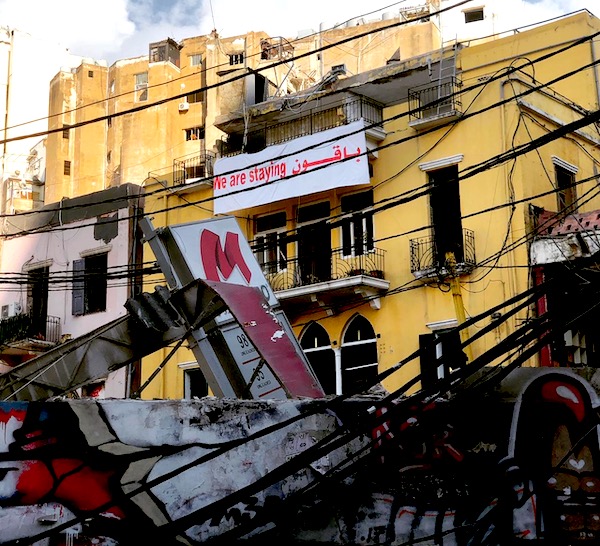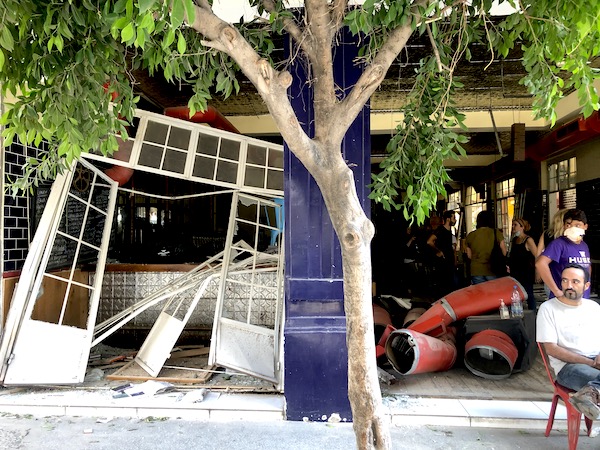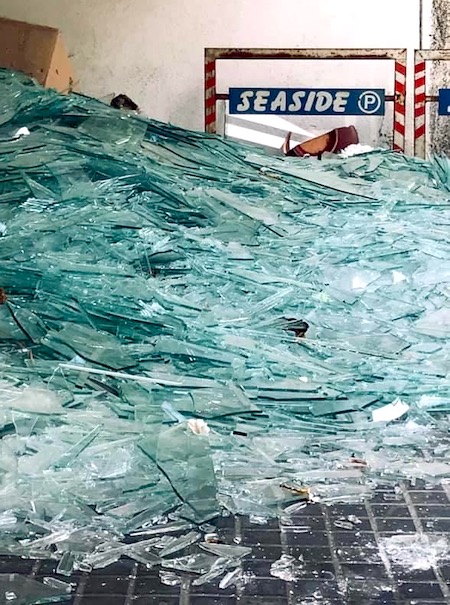
Losing Beirut: On Life in a Shattered City
Rima Rantisi Mourns for What May Never Be Recovered
It was my first.
Leo wanted to finish building the haunted house he created out of materials he found around the house. It was a replica of the one he created with his buddy Olivier the day before. They had sat at Olivier’s dining table and pasted small paper bats and whatever they could find onto a small egg carton. Leo had drawn pumpkins which he recently became familiar with from a book his school librarians distributed from a small card table on the sidewalk just a few weeks earlier. Now, it was wind-down time, and it was hot. We had just climbed the seven flights of stairs to our apartment because there was no electricity and no generator—the electricity had been coming for only a few hours a day for the past few weeks due to government mismanagement. And the generator guy had tripled his price and cut the electricity to the elevator. I was seething. Dripping with sweat on an early August day, we opened the sliding door and camped on the spacious wrap-around balcony of our apartment, perched on the far western tip of Beirut, where the sea breezes leave patches of rust.
I set up his egg carton and paints, and I left to get us some water. The building swayed. I froze. The building swayed. Was this an earthquake? I looked around and a sudden ominous gust of wind swept onto the balcony before the loudest sound I had ever heard exploded through our bodies and shook the city. A surreal sense of expectation surrounded me like a haze as I ran to Leo.
In Beirut, we have been in mourning. Every day since the October 17 Revolution was swept off the streets due to the pandemic, we have been burying pieces of our city. We say goodbye to our money, our currency having all but died, and our livelihoods and pleasures with it. We say goodbye to friends and family who cannot manage living here anymore. We say goodbye to our institutions who cater to the bottom dollar. We are all buckling under the pressure of hyperinflation, corruption, the loss of hope. Each time a business shuts down or a friend gets on a plane or someone is let go from their job, we get that deep sickening feeling of loss—another part of the city, another part of us is leaving because it will never get better. But we also think: It cannot get worse. We cannot sink lower than the dismantling of everything we have built.
 Photo by Sarah Attalah.
Photo by Sarah Attalah.
Then the port of Beirut blew up. Glass rained down into glittering streets. People walked the city dripping blood. Bodies at the port, including firefighters sent to put out a fire that started minutes before the explosion, evaporated in the explosion, their faces remaining on a missing persons Instagram account. Employees serving drinks or waiting tables, parents at home with their children, friends sitting in cafes, women giving birth, people living their quotidian lives, getting a glass of water from the kitchen, suddenly found themselves under rubble, shredded by broken glass, stunned and shocked or dead. Their homes and offices gone. People pulled loved ones out from under the rubble. The hospitals filled. It was the moment that changed us all. We would never live in the city we knew in the same way again. Who would rebuild? Who wouldn’t? Who could ever forget?
For ten months, since October 17, a single question persisted: Is this an uprising or a revolution? People kept citing history: Blood had to be spilt if we ever wanted a revolution. But none of us wanted that. We prided ourselves on being peaceful, civilized. The post-war generation led the discourse as millions marched in squares around the country and world and claimed: “The civil war has ended.” We were sure there would be a revolution; there was no way they could continue while gas and wheat became scarce, and the banks confiscated our money, and more and more people slept on the street or went hungry. Hope soared as Lebanese all over the country and globe joined in. Later, we would know it was a hope we felt in each other. The ruling class did not change.
A walk through the blown-out districts near the port is a walk through our memories, the days before the explosion and the fall of our currency and the pandemic.
In January of this year, they voted in a new government styled as “independent technocrats,” puppets of the same warlords who had led us to the streets. While the people surrounded the parliament to blockade the parliamentarians from arriving for the vote of confidence session, the riot police launched teargas at protesters as the new government was announced on television. We were fighting for our lives. We were fighting so that we would not lose our country. We had already lost so much. How could we have known that we soon would lose more in a pandemic that shut down more businesses, left more hunger, gave way to unprecedented hopelessness, our grandmothers and parents telling us this was worse than the civil war?
And then: 2,750 tons of ammonium nitrate blew up in the center of Beirut.
Now there is blood.
It was the morning after the explosion when Olfa weepily told me that her new apartment just across from the port was destroyed.
“It’s okay, we will clean it,” I told her.
“No, no, you don’t understand. It’s gone,” she said.
I didn’t understand.
“The building is destroyed,” she said.
The disbelief that prevails in the aftermath of such a trauma is considered “normal” by psychologists as one’s body and mind process the enormity of the events and attempt to fathom the new reality in front of them. Everyone I know is having trouble sleeping, jumping at the slightest sound, feeling sapped of energy and full of rage and sadness. Nothing feels normal.
In this country, over the past year, we have had to re-compute how we live at all levels of our lives—politically, financially, health-wise, and now in the aftermath of our capital city’s destruction. In the past year, we have been consumed by learning and talking about economics and hunger and politics and pandemics and ammonium nitrate because in the absence of a government, and the crumbling of our society’s structures, we are suddenly entirely responsible for our country. In the wake of the blast, we clean the rubble and pull dead people from it, we fundraise to rebuild. The government is completely and entirely absent—in fact, it just resigned yesterday—except for when it wants to protect itself. We are so embedded in the aftermath of our government’s crimes that we cannot handle any other concerns, any social media posts about webinars or readings in safe cute places across the world. We had those safe places. They are gone now. Memory and shock have replaced them.
In a Facebook post after the explosion, Olfa wrote: “The shock is re-occurring every second a flashback of the explosion appears. During our days, we talk about nothing but the collective trauma we experienced, how everyone has reacted in their own way, we talk about nothing but the anger, the loss, the bleakness and revenge. We have nothing else to talk about. Can you imagine what that must be like?”
 Photo by the author.
Photo by the author.
A walk through the blown-out districts near the port is a walk through our memories, the days before the explosion and the fall of our currency and the pandemic. We must rewind past the clocks that stopped at 6:07 pm on August 4, past pandemic lockdown, far back to times before October, when the love/hate relationship with this city perpetually energized and depleted us like addicts on IVs. We knew its corruption ran deep, but so did our love for its chaos and how nowhere else spun out into story like it. We were like kamikazes, ignoring the likelihood of all this buried corruption blowing up in our faces.
We never described this area as “near the port.” Now we do, we always will. I had never really looked at it. It was only a landmark. Everyone’s horror stories of having to give exorbitant bribes for anything that arrived to the port made it the last place you wanted to go. It was not one of those ports like you find in Athens where seagulls fly happily and promises of the sea lie ahead. It was like any other strategic institution in Lebanon, under the purview of Hezbollah, who needed it for its military operations inside and outside Lebanon. Now we are looking at it through the jagged skyline of the districts we knew so well. Now we covet it like a lost past.
In the wake of the blast, we clean the rubble and pull dead people from it, we fundraise to rebuild. The government is completely and entirely absent.
Almost every single building in the district near the port where Beirut goes to dinner, to galleries, for drinks, bookshops, was destroyed, except for the few saved by luck and the physics of shockwaves. Here is where Rami and I spent every anniversary. Here is the table, now covered in debris, we sat at one year with my father for Father’s Day. Here is the café where we held readings this year, to get away from university. Here is the first outing I ever had in Beirut. Here is where we walked countless times on the tiny-tiled sidewalks along the line of old pastel-colored homes with high ceilings and spacious balconies and pillars, reminding us of a past we’d never lived.
Now it teems with people walking through broken glass, shutters, wooden planks, people’s belongings all shoveled into piles. We walk through the front door of one of these old homes into a courtyard to search for an old cat with kidney problems whose owner was in the hospital. We call for the cat, but I cannot understand how we can possibly find it under everything. I feel guilty that I only half-heartedly look. I feel like I am useless amongst the rubble of people’s lives. I feel like an invader. We move with the flow of civilian soldiers carrying brooms, wearing masks and helmets, and we know we are now in charge. We barely know what we are doing. We just know we have to. This is Beirut now.
 Photo by Jad Melki.
Photo by Jad Melki.
It’s been a week, but it feels like the last forty years of war and corruption and lies have replayed themselves.
Writer and friend, Lina Mounzer, recently wrote this in the aftermath of the explosion of August 4 at the port of Beirut: “Growing up in Lebanon taught me that an explosion resonates across time, that the shock reverberates forward into your life, and the pressure reconfigures the landscape of the mind. I know that it comes to shape everything you think you deserve from the world. The people of Beirut have been shaped by the bombs that reconfigured this country.”
My mom in Illinois has murderous thoughts. My friends have murderous thoughts. Beirut wants the warlords-turned-parliamentarians hanged. Gallows fill the squares, dangling with cardboard cutouts of the murderers. How could we have thought otherwise? How could we have thought that those who ordered murders of hundreds of thousands of people in the civil war could be anything else? Was it their suits? Was it that we didn’t think we deserved anything else? Was it when we called it a “revolution” we suddenly knew something that was still buried so deep we couldn’t touch it?
Leo continued to sit in the same spot with his haunted house, he didn’t scream or cry. I ran to him and scooped him up. I didn’t know where to go and then vaguely remembered from stories about the civil war that the corridor was the safest space. I was panting. Leo wanted to know why I was talking like that, why my face looked like that. I cannot remember what I said to him, but I hope it doesn’t sit in the recently-formed crevices of his brain to leak and poison him. I don’t remember if he was with me when I went back out to the balcony. “What happened?” I asked my neighbor across the way. “Look!” she pointed at the blood-orange plume of smoke that seemed to be in our neighborhood. I don’t remember if he heard me say Rami’s name over and over. I don’t remember if I was holding him when Rami facetimed me from the street on his bike, the earth nearly having thrown him off it as glass rained down, and I was so happy he was alive.
Every day we remember someone we need to check on. We now know the enormity of the damage, but as we wait for replies we do not know who got lucky and who did not. The shockwaves caused homes to implode. Those of us who had our windows and doors open had less or no damage. Lina went to get me a glass of water after the raging protest four days after the explosion as I walked in sweating and panting, having just left the scene of a warzone. She found a single cracked glass in the cupboard that she hadn’t noticed before. The shockwaves of such an explosion will play out in our lives in mysterious ways, reminding of us our luck and the burden of their irreversible processes.
Today, all of the cliches of beauty that have defined the country—the joie de vivre, the resilience, the hospitality, the food, the harmony of east and west—have no weight.
We have grown skinny and ashen, we barely eat or think to eat. Sometimes we think, “Good, we are saving money.” The pandemic remains a blurry reality. The masks we wear protect us from the virus and the festering garbage and the ammonium nitrate and the teargas. At the day of rage protest, I run from a blast of teargas that burns my face and constricts my throat. People nearly trample each other in the square to get away. When I finally escape the mob of people, I find a formidable empty blown-out building—I cannot remember what it was before. I sit on the cold marble floor against a wall and take big gulps of breath. The light from the glassless doors and windows is strangely beautiful.
It is the beauty that eludes us. Beirut has always been a place that seduces its visitors. When I came to live in this city thirteen years ago, I fell in love with it immediately. You can smell the mix of gas and fresh bread and piss and jasmine flowers all in one block. You love your neighbor who yells from her seventh-floor balcony down to the street. You feel and see all of the political and social negligence on the street in the form of garbage and homeless people and broken infrastructure next to refurbished old homes and businesses and international chains. You are proud that when your friends come to visit, they can get on in one of at least four languages. You can walk and visit a friend without appointment. There are these clashes of beauty and ugliness that have always seduced us. They make us feel like we are living a real life.
But today, all of the cliches of beauty that have defined the country—the joie de vivre, the resilience, the hospitality, the food, the harmony of east and west—have no weight. The ugliness outweighs the beauty, and it outweighs any semblance of the identity that has buoyed this festering place of corruption all of these years. Today Beirut city is the site of a mass murder. The blast did not only destroy our city, it destroyed any previous delusions that we could get it back without bloodshed.
To get our country back, our city back, they said we need blood. But it’s our blood that was lost. Now we need theirs.
Featured photograph by Marwan Tahtah.
Rima Rantisi
Rima Rantisi is a faculty member in the Department of English at the American University of Beirut where she teaches academic and creative writing. She is the founding editor of Rusted Radishes: Beirut Literary and Art Journal, which publishes artists and writers from Lebanon, its diaspora, and the region and is currently in its eighth circulation. Her essays can be found in the anthology Arab Women Voice New Realities, Assay: A Journal of Nonfiction Studies, Al Modon, and Sweet: A Literary Confection. Her essay “Days of Pearls,” published in The Slag Glass City was nominated for a 2019 Pushcart Prize. She holds an MFA in Creative Nonfiction from the Vermont College of Fine Arts.












